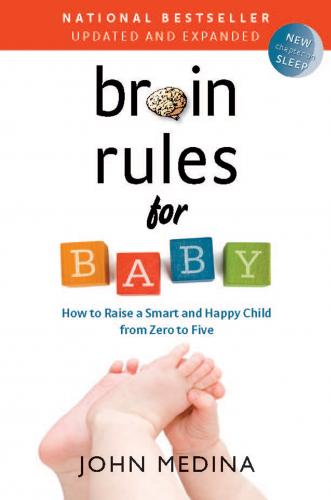BONUS MATERIAL
www.brainrules.net
Videos guide you through parenting concepts
John Medina hosts fun videos on speaking in parentese, the cookie experiment, dealing with temper tantrums, and more. Plus, take our parenting quiz.
Film featuring John Medina
Take a lively, 45-minute tour of the 12 original Brain Rules for home, work, and school—from “Exercise boosts brain power” to “Sleep well, think well.”
BRAIN RULES FOR BABY. Copyright © 2014 by John J. Medina.
All rights reserved. No part of this book may be used or reproduced in any manner whatsoever without written permission except in the case of brief quotations embodied in critical articles or reviews.
Requests for permission should be addressed to:
Pear Press
P.O. Box 70525
Seattle, WA 98127-0525
U.S.A.
This book may be purchased for educational, business, or sales promotional use. For information, please visit www.pearpress.com.
SECOND EDITION
Edited by Tracy Cutchlow
Designed by Greg Pearson
Library of Congress Cataloging-in-Publication has been applied for.
ISBN-13: 978-0-9832633-9-5
10 9 8 7 6 5 4 3 2 1
To my amazing kids
and their even more amazing mother,
for teaching me that when confronted with a choice
between two equally plausible theories,
it is always best to take the one
that is funnier.
contents
Parenting’s purpose is brain development ~ The importance of being selective about science ~ Why do we need parents, anyway? ~ Six inescapable questions
Four things that improve a baby’s brain development ~ Is morning sickness a good thing? ~ When your baby can hear you, smell you ~ The effects of severe stress
Bundle of joy? Yes, but… ~ The four biggest reasons you’ll fight ~ Guys, get out the vacuum cleaner ~ Two steps to a relationship that’s good for baby
smart baby: seeds
8,000 neurons per second! ~ The brain can’t learn unless it feels safe ~ What does “smart” mean? ~ Seven types of intelligence ~ Every brain is wired differently
smart baby: soil
The best kind of playroom ~ Talking to your child improves IQ ~ How to raise cognition scores by 50 percent ~ TV before age 2 ~ The harm in hyper-parenting
happy baby: seeds
Could happiness be genetic? ~ Where emotions happen in the brain ~ Magical mirror neurons ~ Emotions and logic are not as separate as you think
happy baby: soil
The secret to happiness ~ Using empathy to calm your child’s nerves ~ The one parenting style that works
moral baby
Are babies born moral? ~ The three-legged stool of discipline ~ Kids lie a lot (every two hours, by age 4) ~ Explaining your rules
sleepy baby
The Tower of Terror ~ Let sleeping babies lie ~ Reading all the baby sleep books ~ NAP vs. CIO: a prizefight ~ A four-step plan
conclusion
practical tips
acknowledgments
index
pregnancy
Healthy mom, healthy baby
relationship
Start with empathy
smart baby
Feeling safe enables learning Face time, not screen time
happy baby
Make new friends but keep the old Labeling emotions calms big feelings
moral baby
Firm discipline with a warm heart
sleepy baby
Test before you invest
Every time I lectured to a group of parents-to-be about baby brain development, I made a mistake. The parents, I thought, had come for a tasty helping of science about the brain in utero—a little neural crest biology here, a little axonal migration there. But in the question-and-answer session after each lecture, the questions were always the same. A very pregnant woman, one rainy night in Seattle, asked, “What can my baby learn while she is still in my womb?” Another woman wondered, “What’s going to happen to my marriage after we bring our baby home?” A dad delivered his question with some intensity: “How do I get my kid into Harvard?” An anxious mom asked, “How can I make sure my little
